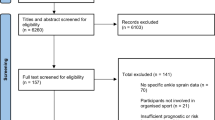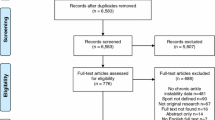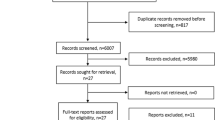Abstract
Purpose
To perform a systematic review aimed to determine (1) if the postural stability deficit represents a risk factor for ankle sprains; (2) the most effective postural stability evaluation to predict ankle sprains and (3) eventual confounding factors that could influence postural stability and ankle sprain risk.
Methods
A systematic electronic search was performed in MEDLINE, EMBASE and CINAHL using the search terms (balance) OR (postural stability) matched with (lower limb) OR (ankle) OR (foot) and (sprain) OR (injury) on October 2 2017. All prospective studies that evaluated postural stability as risk factor for ankle sprains were included. The PRISMA Checklist guided the reporting and data abstraction. Methodological quality of all included papers was carefully assessed.
Results
Fifteen studies were included, evaluating 2860 individuals. Various assessment tools or instruments were used to assess postural stability. The injury incidence ranged from 10 to 34%. Postural stability deficit was recognized as risk factor for ankle sprain (OR = 1.22–10.2) in 9 cases [3 out of 3 with Star Excursion Balance Test (SEBT)]. Among the six studies that measured the center-of-gravity sway, five were able to detect worse postural stability in athletes that sustained an ankle sprain. In nine cases, the measurement of postural stability did not show any statistical relationship with ankle sprains (four out of five with examiner evaluation). In the studies that excluded patients with history of ankle sprain, postural stability was reported to be a significant risk factor in five out of six studies.
Conclusions
The ultimate role of postural stability as risk factor for ankle sprains was not defined, due to the high heterogeneity of results, patient’s populations, sports and methods of postural stability evaluation. Regarding assessment instruments, measurement of center-of-gravity sway could detect athletes at risk, however, standardized tools and protocols are needed to confirm this finding. The SEBT could be considered a promising tool that needs further investigation in wider samples. History of ankle sprains is an important confounding factor, since it was itself a source of postural stability impairment and a risk factor for ankle sprains. These information could guide clinicians in developing screening programs and design further prospective cohort studies comparing different evaluation tools.
Level of evidence
I (systematic review of prospective prognostic studies).

Similar content being viewed by others
References
Attenborough AS, Sinclair PJ, Sharp T, Greene A, Stuelcken M, Smith RM, Hiller CE (2017) The identification of risk factors for ankle sprains sustained during netball participation. Phys Ther Sport 23:31–36
Beynnon BD, Murphy DF, Alosa DM (2002) Predictive factors for lateral ankle sprains: a literature review. J Athl Train 37(4):376–380
Brown CN, Ko J, Rosen AB, Hsieh K (2015) Individuals with both perceived ankle instability and mechanical laxity demonstrate dynamic postural stability deficits. Clin Biomech (Bristol Avon) 30(10):1170–1174
Bullock-Saxton JE (1995) Sensory changes associated with severe ankle sprain. Scand J Rehabil Med 27(3):161–167
Cote KP, Brunet ME, Gansneder BM, Shultz SJ (2005) Effects of pronated and supinated foot postures on static and dynamic postural stability. J Athl Train 40(1):41–46
Crockett NJ, Sandrey MA (2015) Effect of prophylactic ankle-brace use during a high school competitive basketball season on dynamic postural control. J Sport Rehabil 24(3):252–260
Dallinga JM, Benjaminse A, Lemmink KA (2012) Which screening tools can predict injury to the lower extremities in team sports?: a systematic review. Sports Med 42(9):791–815
Dallinga JM, van der Does HT, Benjaminse A, Lemmink KA (2016) Dynamic postural stability differences between male and female players with and without ankle sprain. Phys Ther Sport 16:17:69–75
de Noronha M, França LC, Haupenthal A, Nunes GS (2013) Intrinsic predictive factors for ankle sprain in active university students: a prospective study. Scand J Med Sci Sports 23(5):541–547
Deville ́ WL, Buntinx F, Bouter LM et al (2002) Conducting systematic reviews of diagnostic studies: didactic guidelines. BMC Med Res Methodol 3:2–9
Earl JE, Hertel J (2001) Lower-extremity muscle activation during the Star Excursion Balance Tests. J Sport Rehabil 10(2):93–104
Engebretsen AH, Myklebust G, Holme I, Engebretsen L, Bahr R (2010) Intrinsic risk factors for acute ankle injuries among male soccer players: a prospective cohort study. Scand J Med Sci Sports 20(3):403–410
Fong DT, Hong Y, Chan LK, Yung PS, Chan KM (2007) A systematic review on ankle injury and ankle sprain in sports. Sports Med 37(1):73–94
Gribble PA, Hertel J, Plisky P (2012) Using the Star Excursion Balance Test to assess dynamic postural-control deficits and outcomes in lower extremity injury: a literature and systematic review. J Athl Train 47(3):339–357
Gribble PA, Terada M, Beard MQ, Kosik KB, Lepley AS, McCann RS, Pietrosimone BG, Thomas AC (2016) Prediction of lateral ankle sprains in football players based on clinical tests and body mass index. Am J Sports Med 44(2):460–467
Hadzic V, Sattler T, Topole E, Jarnovic Z, Burger H, Dervisevic E (2009) Risk factors for ankle sprain in volleyball players: a preliminary analysis. Isokinet Exerc Sci 2009 17(3):155–160
Hegedus EJ, McDonough SM, Bleakley C, Baxter D, Cook CE (2015) Clinician-friendly lower extremity physical performance tests in athletes: a systematic review of measurementproperties and correlation with injury. Part 2—the tests for the hip, thigh, foot and ankle including the starexcursion balance test. Br J Sports Med 49(10):649–656
Hiller CE, Refshauge KM, Herbert RD, Kilbreath SL (2008) Intrinsic predictors of lateral ankle sprain in adolescent dancers: a prospective cohort study. Clin J Sport Med 18(1):44–48
Hrysomallis C, McLaughlin P, Goodman C (2007) Balance and injury in elite Australian footballers. Int J Sports Med 28(10):844–847
Janssen KW, van der Zwaard BC, Finch CF, van Mechelen W, Verhagen EA (2016) Interventions preventing ankle sprains; previous injury and high-risk sport participation as predictors of compliance. J Sci Med Sport 19(6):465–469
McGuine TA, Greene JJ, Best T, Leverson G (2000) Balance as a predictor of ankle injuries in high school basketball players. Clin J Sport Med 10(4):239–244
McHugh MP, Tyler TF, Tetro DT, Mullaney MJ, Nicholas SJ (2006) Risk factors for noncontact ankle sprains in high school athletes: the role of hip strength and balance ability. Am J Sports Med 34(3):464–470
Meardon S, Klusendorf A, Kernozek T (2016) Influence of injury on dynamic postural control in runners. Int J Sports Phys Ther 11(3):366–377
Moher D, Liberati A, Tetzlaff J et al (2009) PRISMA Group. Preferred reporting items for systematic reviews and meta-analyses: the PRISMA statement. PLoS Med 6:e1000097
Onate JA, Everhart JS, Clifton DR, Best TM, Borchers JR, Chaudhari AM (2016) Physical exam risk factors for lower extremity injury in high school athletes: a systematic review. Clin J Sport Med 26(6):435–444
Paterno MV, Schmitt LC, Ford KR et al (2010) Biomechanical measures during landing and postural stability predict second anterior cruciate ligament injury after anterior cruciate ligament reconstruction and return to sport. Am J Sports Med 38(10):1968–1978
Plisky PJ, Gorman PP, Butler RJ, Kiesel KB Underwood FB, Elkins B (2009) The reliability of an instrumented device for measuring components of the star excursion balance test. N Am J Sports Phys Ther 4(2):92–99
Plisky PJ, Rauh MJ, Kaminski TW, Underwood FB (2006) Star Excursion Balance Test as a predictor of lower extremity injury in high school basketball players. J Orthop Sports Phys Ther 36(12):911–919
Schneider S, Seither B, Tönges S, Schmitt H (2006) Sports injuries: population based representative data on incidence, diagnosis, sequelae, and high risk groups. Br J Sports Med 40:334–339
Taylor JB, Ford KR, Nguyen AD, Terry LN, Hegedus EJ (2015) Prevention of lower extremity injuries in basketball: a systematic review and meta-analysis. Sports Health 7(5):392–398
Trojian TH, McKeag DB (2006) Single leg balance test to identify risk of ankle sprains. Br J Sports Med 40(7):610–613
Verhagen EA1, Bay K (2010) Optimising ankle sprain prevention: a critical review and practical appraisal of the literature. Br J Sports Med 44(15):1082–1088
Wang HK, Chen CH, Shiang TY, Jan MH, Lin KH (2006) Risk-factor analysis of high school basketball-player ankle injuries: a prospective controlled cohort studyevaluating postural sway, ankle strength, and flexibility. Arch Phys Med Rehabil 87(6):821–825
Willems TM, Witvrouw E, Delbaere K, Mahieu N, De Bourdeaudhuij I, De Clercq D (2005) Intrinsic risk factors for inversion ankle sprains in male subjects: a prospective study. Am J Sports Med 33(3):415–423
Willems TM, Witvrouw E, Delbaere K, Philippaerts R, De Bourdeaudhuij I, De Clercq D (2005) Intrinsic risk factors for inversion ankle sprains in females—a prospective study. Scand J Med Sci Sports 15(5):336–345
Winter DA (1995) Human balance and posture control during standing and walking. Gait Posture 3:193–214
Witchalls J, Blanch P, Waddington G, Adams R (2012) Intrinsic functional deficits associated with increased risk of ankle injuries: a systematic review with meta-analysis. Br J Sports Med 46(7):515–523
Author information
Authors and Affiliations
Corresponding author
Ethics declarations
Conflict of interest
All the authors declare no conflict of interests related to the ideation, preparation and production of the present manuscript.
Funding
No funding was present.
Ethical standards
Due to the review nature of thie paper, no human patients nor animal were involved in any phase of the study preparation.
Electronic supplementary material
Below is the link to the electronic supplementary material.
Rights and permissions
About this article
Cite this article
Grassi, A., Alexiou, K., Amendola, A. et al. Postural stability deficit could predict ankle sprains: a systematic review. Knee Surg Sports Traumatol Arthrosc 26, 3140–3155 (2018). https://doi.org/10.1007/s00167-017-4818-x
Received:
Accepted:
Published:
Issue Date:
DOI: https://doi.org/10.1007/s00167-017-4818-x




